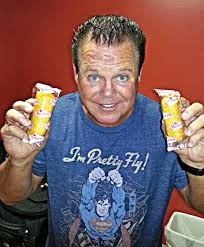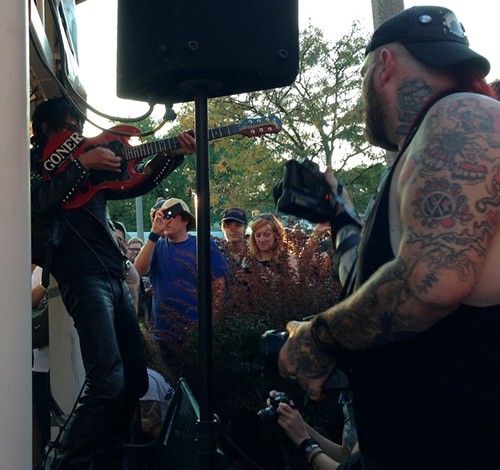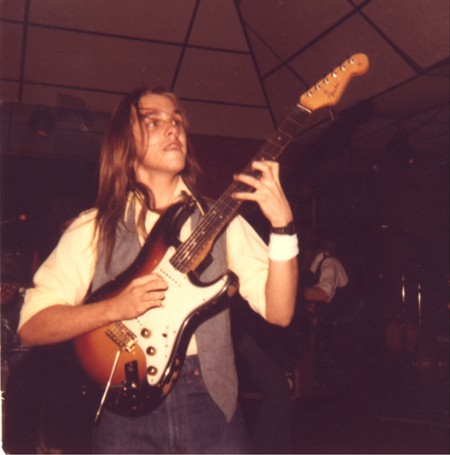
The web’s Sports-media gold standard, Grantland, finally got around to writing about Jerry Lawler. Written by “The Masked Man, aka David Shoemaker, the article follows the long-form essay that is Grantland’s stock in trade.

The web’s Sports-media gold standard, Grantland, finally got around to writing about Jerry Lawler. Written by “The Masked Man, aka David Shoemaker, the article follows the long-form essay that is Grantland’s stock in trade.
Tons of stuff to do this weekend. In your mind, imagine old Antenna boss Mark McGehee reading these listings into a tape recorder. That helps me get psyched up. If you’re too young to remember that sound, we all pat your sad little head.
[jump]
Friday:
The Hi-Tone: Paperhaus, Strengths, Pneumatic Girls, Vanishing Islands
The Poplar Lounge: MIke Dees
Levitt Shell: Patricia Goodson
The New Daisy: One City, One Sound
Newby’s: Keller Williams and the Travelling Courys (bar side) and Super Happy Funtime Burlesque
Center for Southern Folklore: The Pistol and the Queen
The Blue Monkey: Patrick Dodd
Otherlands: Bryan Hayes, Mark Edgar Stuart, and Chris Milam
The Cove: Big Barton
The Buccaneer: Purple
Saturday:
Levitt Shell: Paul Thorn
P&H: Capgun, Shithearts and SVU
Newby’s: John Murry and Stone Stew Jubilee (bar side)
The Cove: The Popes
The Buccaneer: Klaxon
The Poplar Lounge: Interstate Buffalo with Austin Smith
The New Daisy: Creator Vera CD Release Show
Sunday:
The Hi-Tone: Fuzz
If that’s not enough to do, God help us all.
Word had been spreading about a new set of singles from the Bo-Keys. But even before the tracks’ release, the band today confirmed that one of the songs they recorded with Percy Wiggins, “Writing on the Wall,” will be featured in the season premiere of ABC’s Scandal, a drama based on a communications/disaster management expert in Washington, D.C. The show was developed by the creator and producers of Grey’s Anatomy. Wiggins recorded for Atlantic’s ATCO imprint in the ’60s and later worked with Hendrix bassist Billy Cox.
“We’ve always wanted to do something in Memphis,” says Andrew Trube, half of the band Greyhounds.
Trube will have his chance, as Ardent Music has signed Greyhounds, adding to a growing roster and reflecting the ambition of new management at the label.
Trube and Anthony Farrell play guitar and organ in JJ Grey and Mofro.
“Anthony and I have been playing music for 15 years and touring hell’s half-acre — everywhere,” Trube says. “The sax player in Mofro, Art Edmaiston, is from Memphis. Over the years, I’ve become friends with people like Memphis musicians Scott Bomar and Howard Grimes. Just meeting them and hanging out, we knew we had to do something here.
“Reed hollered at us. But he had no idea how deep a connection we had with Memphis already. We’d already gone through Ardent a couple of times. It’s funny how it worked out. Serendipitous.”
“Reed” is Reed Turchi, label director since 2011 at Ardent Music, the secular label associated with Ardent Studios. The label has a venerable history and … a not so venerable history.
Ardent Records began through studio founder John Fry’s association with Stax Records in the late 1960s and ’70s. Stax was initially distributed through Atlantic Records but broke with them in 1968. In 1972, Stax president Al Bell signed a deal with Clive Davis and CBS records that lasted until 1977. Stax’s bankruptcy notice from January 26, 1977, lists the label’s assets, including five albums and eight singles under the Ardent imprint. Two of those albums, #1 Record and Radio City by Big Star, represented the apex of the label’s output.
In the early 1990s, Ardent Music was revived alongside a now-contemporary Christian-oriented label, Ardent Records. The Christian label was and remains a huge success, mainly through platinum-selling band Skillet. The secular side was something of a mess:
A solo Alex Chilton album felt exactly like a contract obligation. Ardent’s attempt to work with the genuine freaks Neighborhood Texture Jam belongs in the studio-lore hall of fame. Finally, the disaster known as Techno Squid Eats Parliament proved to be the camel-crushing straw, and the label was shuttered. (Unless you have a heart condition, go read the allmusic.com entry for Techno Squid Eats Parliament. Seriously.) The label was soon shuttered until 2008, when Jump Back Jake became the first release of the current incarnation of Ardent Music.
Enter Turchi, who was a student at UNC-Chapel Hill when he first began releasing records.
“There’s an old lineage between Chapel Hill, Memphis, and north Mississippi,” Turchi says. “While I was at Chapel Hill, I worked a lot with Bill Ferris and on his Memphis, Oxford, Chapel Hill trajectory.
“While I was working with him, he let me know that he had these old recordings of Mississippi Fred McDowell that were sitting there in the archive at Chapel Hill. I was really into that stuff and still am. I asked him about putting it out, and he was game for it. The tapes were just collecting dust. We started a label called Devil Down, just to put that out into the world. That got more attention than I had ever expected. I’ve done eight releases on that. All of those were during my last two-and-a-half years in Chapel Hill, when I was spending a ton of time, almost every other weekend, in north Mississippi with Kenny Brown, the North Mississippi Hill-Country Picnic. Mary Lindsey Dickinson introduced me to John Fry. That was the summer of 2011, and it went better than anybody expected.”
The label has held on to the Big Star releases and to neo-folkies Star & Micey. Since Turchi’s arrival, the label has added two more acts: Greyhounds and Admirers. Admirers is the project of Mikey James, a producer with a penchant for finding engineers he admires and working with them, the latest being legendary Ardent Studios eminence John Hampton.
But Greyhounds seemed destined to be on Ardent and in Memphis. The partnership is interesting in the sense that Greyhounds has plans to use previously recorded material in addition to using the studio’s human and electronic assets.
“I met them a couple of years ago in passing,” Turchi says of Greyhounds. “The first thing I was doing at Ardent is to try and find bands that were a good fit. The label is not defined by a genre, so there wasn’t a sound that I was looking for as much as a band that we could work with and would benefit from us working with them. Obviously, the Ardent label is not going to be putting out bedroom recordings. We wanted to work with people who are interested in the unique things Ardent offers, which include the Memphis scene and obviously the studio. I started playing their music around the building and everything kept going positively. They were interested in working in Memphis and had talked seriously about doing a record here. The only reason they weren’t signed to a label is that they are spending a lot of time in JJ Grey and Mofro. Greyhounds was their thing before that, but since joining that band they haven’t had to pay rent with it. I read through their Facebook posts, and people want more Greyhounds. Now that we are helping them grow, they are really excited about getting the push. They were afraid it was getting pushed into a side project.”
Trube is excited about the opportunity to salvage earlier material and about the prospect of recording at Ardent with Memphis’ best talent.
“[The older material has] never been properly released,” Trube says. “So it lets us tell the story of what we’re about and then move forward with new stuff. Hoping to get a bunch of the old guys and not necessarily make a Memphis-sounding record, but hand them our tunes and say y’all play them however you interpret them. Sound like you.
“Ardent is sort of like the mortar. It’s the catalyst for all of this stuff to happen. To work with those people … We get to use that lathe in there. I mean, come on, that place is radical.”
You can’t sling a cat in Memphis without hitting a bass player. But banjo players? That’s another matter. World-champion banjo players? There’s only one: Randal Morton.
“My twin brother, Greg, and I started out in 1969,” Morton says. “They called us the Morton Twins. One night, I watched the Glen Campbell Good Time Hour show back in 1969. John Harpeth was playing banjo, and I decided that’s what I wanted to do.
“In 1975, I ended up winning the National Banjo Championship. We worked with Mark O’Connor. On the festival circuit, we became friends with Vince Gill, Marty Stuart, Bill Monroe. Later, we went on USO tours to the Orient and Europe.”
How does is get any better than that?
“Then we ended up going to Hawaii for three years, and we worked on the Don Ho show. We were probably 19 or something.”
See the video of Glenn Campbell and John Harpeth as well as video of the Morton Twins at the Flyer‘s music blog, “Sing All Kinds.”
Randal Morton plays every Monday night at the Buccaneer with Devil Train. Morton also plays in Grassfire and has a regular bluegrass jam at Newby’s.
“We beat him to it,” Hector Bobo shouted, when asked whether his band the Fuzz was named before frequent Goner artist Ty Segall’s Fuzz. It’s a small town, so it’s important that this be set straight.
Hector is the belligerent alleged twin/alter ego of Harlan T. Bobo. Harlan is known for his albums Too Much Love, I’m Your Man, and Sucker, full of beautifully rendered, emotionally raw songs derived from personal crises.
“This album is nothing like that,” Hector avers. And it isn’t.
Recorded with the Fuzzjerk mobile unit at an undisclosed location, the Fuzz’s eponymous debut is fast and dirty. Where Harlan records feature some of the city’s most renowned session players, the Fuzz is made up of more unruly and obscure sorts. The band grew out of the Flamin’ A’s, a band formed by musicians who had been fired from Limes.
“I don’t know what you’d have to do to get kicked out of the Flamin’ A’s. Nobody can get canned from the A’s,” Hector says.
Members of the Fuzz are Tom Jones and Jeff Bunny Dutton. The two last recorded as Action Family almost 20 years ago but play live and add fantastic energy to the record. Jones’ drum sounds and performances add dimension that many garage/lo-fi records don’t have. Dutton’s guitar work is surly and insolent, but his parts are well placed and his tone has a great manic electricity.
Steve Selvidge plays bass and adds background vocals. His presence is heard in other ways: “We started out trying to cut to Pro Tools, but it really wasn’t working. Then we fired up the TEAC, and it was just perfect,” Selvidge says
“We are so happy to have him. He held this mess together,” Hector adds.
“Actually, this band picks bass players based on hair,” Dutton confirms.
It does sound good. Better than many records in the lo-fiosphere. But the performances are real. This isn’t a cut-and-paste-sounding record. It’s an unruly collection of songs that cover a lot of ground in an unpretentious way. There is definitely input from California punkers like the Vandals. But there are also hints of Magical Mystery Tour. There must be something in the Bobo blood that intuitively takes simple forms and tweaks them away from repetitiveness with great chord changes. It’s still not an easy process.
“We were doing industrial stuff for a while,” Bobo says. “The really drunk stuff we did at my house.”
“We fell apart at his house,” Jones says. “We were just writing and throwing things out.”
Eventually, it worked out. With photography by the omnipresent Jamie Harmon and package design by the band, the CD is a fully rendered record that still feels like something dangerous. The cover instructs listeners to play it loud. They should.
Somewhere out there, Ty Segall is on his way to Memphis. His band Fuzz — minus the definite article — represents the latest in a protean march through the lo-fi landscape. Segall has recorded for Memphis’ Goner Records on 2007’s Caesar 7-inch and Ty Rex II in 2013. He also has records out on Drag City, and Fuzz comes from L.A.-based In the Red Records.
Fuzz’s first album debuted on Monday. The self-titled release has similar energy to their nemeses in the Fuzz. But where Bobo’s gang trades on the Californian anger of the 1980s, Segall harkens more toward the 1960s. Citing Blue Cheer as an influence, he certainly lives up to it. But where much of the crunchy psychedelia he channels failed due to long-windedness and hokeyness, Segall imports a Brit-punk sensibility that keeps things from getting to groovy. And it’s not just John Lydon in his sound. There’s more than a bit of Syd Barrett too.
“Loose Sutures” is a Sabbath-derived romp. Segall’s tones have a Link Wray sort of sneer, but the determining factor here is fuzz, papery, static, and electric-sounding guitar. “Earthen Gate” is a Vol. 4-era arrangement with reverb-drenched vocals and guitar-forward heft.
Fuzz plays the Hi-Tone on Sunday, October 6th.
Some say Segall had a single out first. Others say you never mess with Hector Bobo. I’m staying out of it.

Dang. We got seven — count ’em, seven — photos. No imaginary prizes will be awarded given our failure to reach 10 submissions for our top 10 contest. Come on, yall!
By Chris McCoy
The tenth edition of Gonerfest found the annual celebration of garage punk looking both behind at the genre’s history and ahead at the music’s next evolutionary steps. Wreckless Eric, the Cosmic Psychos and Mudhoney made a forceful case that age ain’t nothing but a number; Gonerfest favorites like Quintron, Tyvek, and Digital Leather were worthy of their reputations; and newcomers like Ex-Cult proved that there is still plenty of life left in punk, garage, or whatever it is we’re calling the rock and roll these days.
[jump]
There were plenty of firsts in this tenth edition of the festival. Guitar Wolf, the Japanese band who graced the first Goner single and who are still going strong 20 years later, provided a couple of them. I’m going to go out on a limb and say that the titanic set they played in the gazebo at the corner of Cooper and Young spawned the first ever mosh pit and crowd surfing event to occur at that storied corner, a sound and sight which bewildered tourists who were disgorged from a bus in the middle of rock Armageddon.

This is the first Gonerfest to be held at the new Crosstown location of the Hi-Tone, and I have to say that, nostalgia for the old band shed notwithstanding, the new digs provided a superior experience in every respect.
Tyvek’s tight, impassioned performance was followed by Quintron’s amazing techno swamp organ headlining set, which made for the best hat trick in the fest.
I missed Friday afternoon at the Buccaneer, but the Hi-Tone show kicked off with an atomic but all too brief set from Memphis’ own True Sons Of Thunder, who brought the noise big time:
The rest of the night was high energy and high quality. Nick Diablo brought the latest droney, glam-tinged incarnation of his long-running project Viva L’American Death Ray Music back to Memphis from New York; Nashville’s Cheap Time snarled through their set of no-frills punk; Head was all straight ahead, Ramones-y energy; and the always entertaining Timmy Vulgar brought out the pyrotechnic ray gun for a psychedelic Human Eye romp. The much anticipated headlining set from Mudhoney lived up to the hype, as the Seattle legends played a set that spanned their 20 year history, generously salted with their classics, like “Sweet Young Thing Ain’t Sweet No More” and “You Got It (Keep It Outta My Face)” and even an out-of-left-field cover of Ministry’s 1988 industrial dance anthem “Stigmata”.
Saturday’s afternoon blowout at Murphy’s was a succession of great moments with 11 bands trading off between two stages while the smell of grilled hot dogs and hamburgers floated in the air. I always seem to discover some great new sounds on Gonerfest Saturday afternoon, and this year it was two bands that couldn’t have been more different. Melbourne, Australia’s Cuntz’ vicious punk onslaught was the hardest rocking set of the afternoon. Then the Milwaukee band Sugar Stems went in completely the opposite direction with some classically constructed, Cheap Trick-esque power pop that was a welcome respite from all of the testosterone on display. Later, Gonerfest vets Digital Leather got the outside crowd moving with synth-punk and attitude. But it was Harlan T. Bobo’s latest band The Fuzz that really stole the show on the outside stage. Battling sound problems, Harlan’s brought a raft of new material that brought his prodigious songwriting talent to bear on two-guitar punk. Judging from the number of people I saw with copies of The Fuzz’s debut records tucked under their arm, people liked it. A lot. Here’s his cover of the Devo classic “Uncontrollable Urge”.
I have a very low tolerance for solo guys with acoustic guitars, but British punk legend Wreckless Eric’s mixture of wry storytelling, classic songs, and raw charisma was the perfect way to end the afternoon as the sun went down. At least we thought it was over. As the party broke up, a band called Babes which had set up surreptitiously on the side of Tuckers Hot Wings the street started playing, and people scrambled up the side of the hill to check them out. Then, Memphis garage soul combo The Sheiks came roaring into the Murphy’s parking lot in the back of an old pickup truck and blazed through some songs. The dueling guerilla gigs, combined with Central High School homecoming parties at Minglewood Hall and 1588 Madison, made for a surreal, only-in-Memphis scene.
The survivors of the previous 72 hours gathered at The Hi-Tone for the final night’s throwdown. The penultimate band Destruction Unit provided some of the most intense moments of the entire fest with a three-guitar attack produced a roar that was as layered as it was punishing. Imagine if My Bloody Valentine had MC5’s rhythm section and you’ll have some idea of what Destruction Unit sounded like.
The headlining act was The Cosmic Psychos, and they did not disappoint. The Australian legends didn’t just take a much-deserved victory lap, they killed it with a relentless, self-assured set that whipped the tired crowd into a frenzy. The pounding, rock solid beat provided by bassist and frontman Ross Knight provided a perfect foundation for Mad Macka McKeering’s wah wah washed guitar shenanigans. It was a testament the longevity and power of scuzzy garage punk that summed up the festival and the scene that spawned it.
For those of, ahem, you who are too old go make it to Gonerfest, Rocket Science Audio has multi-camera video of most of the bands. There are some great performances. There are more videos at their website.
I like Octa#Grape.
This weekend marks the tenth anniversary of the passing of Shawn Lane. Lane was known the world over as a peerless guitarist. Newby’s is hosting a weekend-long festival of music to remember him. Below, his friend and student Paul Taylor remembers Lane as a mentor and considers Lane’s influence on his musical life.

Shawn Lane was a preternaturally gifted guitarist, who by the age of 14 had mastered his own techniques and speed on the guitar that to this day remain nonreplicable. To this day, the current guitar wizards all genuflect and marvel at his unparalleled speed, melodicism, and compositional skills.
When I was a boy, my father would take me to see Shawn, and I really couldn’t — I still can’t — understand how anyone could play that fast. At first, I made the common mistake of writing it off as finger-wiggling with no depth. My brain couldn’t process it. Many guitarists view Shawn this way at first. Maybe It’s a mechanism of jealousy, or all of our ears are just entirely too slow!
My dad’s band was Shawn’s rhythm section, so I had access to bootleg tapes that would become his Warner Brother record Powers of Ten. I obsessively wore those tapes out. Slowly it began to sink in. This guy was playing very legitimate musical patterns at blinding Art-Tatum-does-triple-time speed. It was no B.S. And it was all on top of his beautiful compositions that had the rare ability to invoke deep feelings. That trait is so hard to come by in instrumental music. It was a rare gift.
Shawn did his best to teach others how to do what he did but always would say that his nervous system was just wired differently.
I had the good fortune of befriending Shawn and playing music with him in my late teens and early 20s. It was at this time that his true depth became clear to me. He was an avid reader, student of philosophy, science and culture; a film devotee; a lover of soundtrack music and classical music. He was a self-taught piano savant and a student of music from all over the world, especially qawwali (Sufi music of Southeast Asia) and Indian classical.
In the last 10 years of Shawn’s life he was able to tour the world in a trio with bassist Jonas Hellborg and master drummer Jeff Sipe. Shawn’s interest in Indian classical music was fulfilled as they toured India, and he made music and studied with many of his heroes. Shawn himself is still regarded as a hero all across Europe and the east.
Shawn languished in obscurity stateside and particularly in his hometown of Memphis. In a city that claims to be a music town, his is no new story: Original artist/innovator can’t buy a gig, while cover bands thrive on Beale and dance and garage bands fuel people’s weekends. Shawn led that double life many of us know well. His craft was recognized largely everywhere on earth except for this town.
After battling illness for most of his adult life and without health coverage, Shawn’s health took a drastic downward turn in 2003, and he died from a lung-related illness 10 years ago today.
Although his technical wizardry will always be that for which he is most known, Shawn’s legacy lies far more in his melodicism and his compositions than in his speed and literally unparalleled technical prowess on guitar (and piano). His soul shines through in his songs: in the singing bits of his guitar parts, the little inflections.
Still, for pure fire and an unworldly experience, watch footage of Shawn. It’s unholy. Actually, it’s totally holy!!
His friends and family sorely miss Shawn, but he isn’t going anywhere. He still sits atop the ever-clattering mountain of competing guitarists, laughing down at a rat race he never had to play a part in. He transcended. He transcends.
LONG LIVE SHAWN LANE!
— Paul Taylor